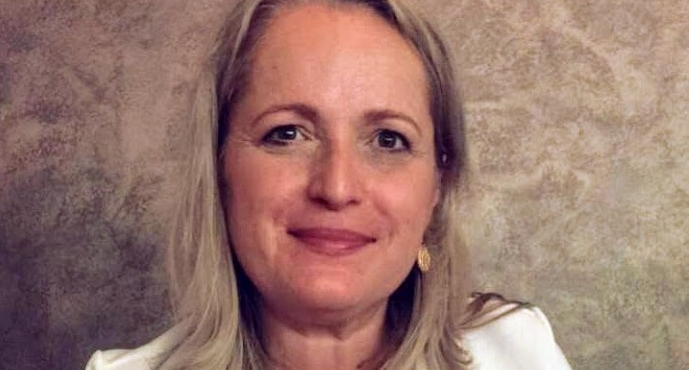Council member Stefi Dodig
By Petra Wallgren Björk | Published: 2019-06-04

Hello Stefi Dodig, Council member for Bosnia & Herzegovina, why should one get involved as a Council member for EAHIL?
If you see yourself as a person who is willing and able to start up and contribute through new findings and information-sharing about their profession in the field of medical librarianship, then personal engagement through membership of EAHIL is the right way for that. In Bosnia & Herzegovina for a long time, the situation has been that libraries and librarians are at the margins of state and social interests or strategies. As a result, a lot of self-motivation and effort are needed to find ways for professional development and not only that, but development in general.
For me as a medical librarian, it is important to offer adequate services and information to our users – these are not only students, teaching staff and researchers, but also all employees and patients from our University Clinical Hospital Mostar as well as high school students. The existence of a professional association such as an EAHIL is of immense significance because we are connected with our colleagues and lots of useful information becomes available to us that way.
In my case specifically as a Council member, I consider that my biggest accomplishment has been to animate my peers in the whole country to apply for EAHIL membership. Taking into a consideration the lack of a functional national organization for librarianship, it has taken me a few years to accomplish that goal. The Library of the Medical Faculty at the University of Mostar has been first and for a long time only EAHIL member from Bosnia & Herzegovina, and now there are five of us.
As a Council member, you’re able to be the source of movement in your branch and in the best possible way help the movement spread through your community.
What are the benefits of engaging in EAHIL?
The most important benefit of engaging in EAHIL for me is the relationship with peers and through them to be connected to contemporary movements in the field of medical information and services at medical libraries.
Taking into consideration the fact that my library is the model of “one (wo)man library”, as well as the aforementioned lack of opportunity for structured professional development in general, the existence of this association is a never-ending source of useful information, ideas and mutual exchange of opinions between colleagues from all around the world. Some of them I was lucky enough to get the chance to meet in person at the EAHIL Conference in Rome, Italy, in 2014, thanks to the EAHIL-EBSCO scholarship.
Unfortunately, because of lack of funds to cover expenses for attending these and similar conferences, it makes me sad that the Rome 2014 Conference will probably be the first and last time that I will have the opportunity to attend one, since from that conference we haven’t managed to find grants here in Bosnia and Herzegovina for this purpose. That is why I’m hoping for live streaming of EAHIL conferences so that at least in that way we would get the chance of gathering new ideas and collecting useful information.
What do you do in your work?
The easiest would be to use an Italian saying “tuttofare”- everything! Selecting, developing, cataloguing and classifying library resources; answering readers’ inquiries; using library systems and specialist computer applications; management of staff, including recruitment, training and/or supervisory duties; liaising with departmental academic staff, external organisations and suppliers; ensuring that library services meet the needs of particular groups of users (e.g. staff, postgraduate students, also in English); managing budgets and resources; supporting independent research and learning; developing IT facilities; assisting readers to use computer equipment, conduct literature searches etc.; promoting the library’s resources to users.
The School of Medicine at University of Mostar was founded in 1997 and within Tempus project (1998-2000). The Medical Library was developed on a modern concept of libraries based on electronic content. Nowadays because of everything mentioned above sometimes it seems that we’re taking two steps backwards taking into consideration our beginning – it demands enormous amounts of effort to resist to that movement so usually there’s very little to no energy left for growth. But great cooperation with EU partner countries has made possible for us to have access to many sources and databases which was very important for the development of our faculty and our young teaching staff and that’s the thing we’re trying to ensure today despite all the difficulties, such as irregular and poor access to databases with full text, international journals, or e-books. We were the first to offer Subito interlibrary loan service in Bosnia and Herzegovina thanks to cooperation with EU colleagues.
Currently, we’re in reorganization plans which placed library space with all its services into one room. This which leaves me unable to hold short courses of information literacy for our students, which was also one of my regular tasks.
Recently, we have had two projects (Tempus and Erasmus) financed by the European Union where the focus was libraries. At our university, I have had an active role in both which has been one extra duty, but in many ways a useful opportunity for professional development and the future of the profession here.
I graduated in Economics and Marketing (Faculty of Economy at University of Mostar) but in these almost 20 years in librarianship I discovered a whole new world that I like a lot because I’m surrounded by young people and professionals in search for knowledge and I can help them.
What do you like to do in your free time?
I like to try out new recipes, read, watch movies, but also my big passion is to travel whenever I have the chance. Soon enough I’ll have the opportunity to have my own garden and I’m excited to see if gardening turns out to be a new hobby, just like I have recently discovered with sewing.